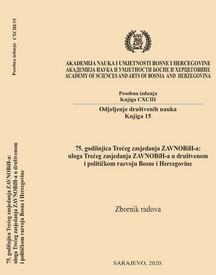ULOGA TREĆEG ZASJEDANJA ZAVNOBIH-A U RAZVOJU KULTURNE POLITIKE BOSNE I HERCEGOVINE
THE ROLE OF THE THIRD SESSION OF ZAVNOBIH IN THE DEVELOPMENT OF THE CULTURAL POLICY OF BOSNIA AND HERZEGOVINA
Author(s): Sarina Bakić
Subject(s): Cultural history, Political history, Social development, Sociology of Culture, WW II and following years (1940 - 1949)
Published by: Akademija Nauka i Umjetnosti Bosne i Hercegovine
Keywords: Third session of ZAVNOBiH; cultural policy; cultural practices; cultural actions; cultural institutions;
Summary/Abstract: Regardless of how we perceive and understand culture, as a system of symbolic meanings, power relations, relations among various concepts, as system of values and validations, culture always represents a tool for articulation of relations among individuals and social groups. In this context, cultural politic is shaped upon the borderline between politics and culture and their mutual influence on all aspects of social life. According to Doknić, state through its ideological and political apparatuses as politically and educationally affirmative content interiorize it in living and working environment and entirely decide about each percent on financial support for culture (Doknić, 2013: 329). In this way, as it is the case with cultural politics in this specific historical period, culture becomes unavoidable factor of entire society’s transformation, planned within the cultural politics system aimed to direct, improve and coordinate limitless cultural space (ibid). Cultural politics as intentional and planned state intervention in the cultural domain, become enormously important part of entire development and positioning of one country. That is why we can claim with certainty that the role of the third assembly of ZAVNOBiH (National Anti-Fascist Council of the People’s Liberation of Bosnia and Herzegovina) is very noteworthy concerning development of cultural politics in Bosnia and Herzegovina. These are ‘pioneers’ steps’ in creating the flow of cultural life in Bosnia and Herzegovina’s society in this particular historical context. This is specifically related to establishment of cultural institutions, which exist today as well and whose universal and humanistic values and aims remain unchangeable. These institutions still nurture art and cultural literacy and reading in this very turbulent and challengeable times we are living in.
- Page Range: 241-250
- Page Count: 10
- Publication Year: 2020
- Language: Bosnian, Croatian, Serbian
- Content File-PDF

